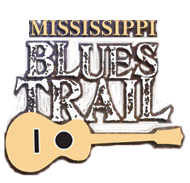Peavine
Peavine - Boyle
The “Peavine” branch of the Yazoo and Mississippi Valley Railroad met the Memphis to Vicksburg mainline at this site. From the late 1890s through the 1930s, the “Peavine” provided reliable transportation for bluesmen among the plantations of the Mississippi Delta. Charley Patton made the branch famous through his popular “Pea Vine Blues.”
Prior to the late 1800s, most of the Mississippi Delta region was covered by swamps, thick forests, and canebrakes. Early plantations were established in areas less prone to flooding, and lumber companies used the Delta’s waterways to transport their products to the Mississippi River and on to distant destinations. However, these efforts were complicated by flooding, seasonal shifts in water levels, and the need for expensive dredging.
A solution came in the form of railways, which were first introduced in the 1870s and criss-crossed the Delta by the early 1890s.The railway system allowed cotton production to flourish, with many plantations served by small lines. One of these was the Kimball Lake Branch, known locally as the “Peavine Branch,” which bluesman Charley Patton saluted in his 1929 Paramount Records recording, “Pea Vine Blues.” The Peavine, originally two narrow-gauge lines run by local entrepreneurs–including a lumber company in Boyle–was taken over in the late 1890s by the Yazoo & Mississippi Valley Company (called the Y&MV).
The line ran from Dockery Plantation, where Patton lived, and then ten miles west to Boyle, where it connected with the “Yellow Dog” (the local slang name for the Y&MV line), which led to Cleveland and points beyond. The term “peavine” was commonly used for railways that followed indirect routes, resembling the vines of the pea plant. Wisconsin-based Paramount Records’ advertising department used a drawing of an actual pea plant to promote Patton’s record.
“Pea Vine Blues” is one of many blues songs about railways–a popular metaphor for escape as well as the primary means by which African Americans left the South during the Great Migration. The song’s meaning was clear to Delta residents, but obscure to others. Patton’s song inspired other recordings on the “peavine” theme by artists including John Lee Hooker, Big Joe Williams, Mississippi Fred McDowell, Charlie Musselwhite, and Rory Block, among others. The leading Japanese blues record company named itself P-Vine Special in 1975, and reissued all of Patton’s recordings on CD in 1992.
content © Mississippi Blues Commission
[ BACK TO TOP ]

